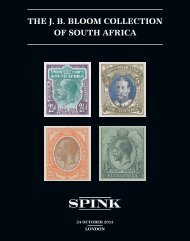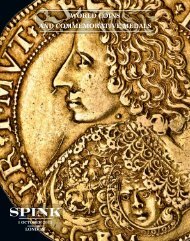bentley priory - Spink
bentley priory - Spink
bentley priory - Spink
You also want an ePaper? Increase the reach of your titles
YUMPU automatically turns print PDFs into web optimized ePapers that Google loves.
September 6, 2012 - LONDON<br />
Warrant Officer H. Dutton, outside Buckingham Palace<br />
having received his D.F.C., 22.6.1945<br />
D.F.C. London Gazette 14.9.1943 Warrant Officer Harry<br />
Dutton (534538), Royal Air Force, No. 44 Squadron.<br />
The Recommendation states: ‘This Warrant Officer has<br />
completed two tours of operational duty involving more than<br />
300 flying hours. During his second tour he has attacked<br />
targets such as Bremen, Essen, and Cologne and has<br />
encountered much intense opposition. Warrant Officer<br />
Dutton has, at all times, displayed great keenness and<br />
efficiency setting a fine example to the other air gunners of<br />
the Squadron.’<br />
534538 Warrant Officer Harry Dutton, D.F.C., born<br />
Congleton, Cheshire, 7.7.1912; enlisted in the Royal Air<br />
Force, 7.9.1936; served during the Second War with No. 2<br />
(Army Co-operation) Squadron (Lysanders), and took part in<br />
his first operational sortie in October 1939; soon after the<br />
outbreak of the War No. 2 Squadron moved to France as part<br />
of the British Expeditionary Force’s Air Component; the<br />
Lysanders spotted for the Artillery and bombed front line<br />
positions and troop concentrations- No.2 Squadron stayed in<br />
France until the Dunkirk evacuation. Having completed his<br />
first operational tour transferred to No. 44 (Rhodesia)<br />
Squadron (Lancasters), Waddington, under the Command of<br />
Wing Commander Roderick Learoyd, V.C., February 1942;<br />
flew in at least 31 operational sorties with the Squadron, his<br />
first action being taking part in the 1000 Bomber Raid over<br />
Essen, 1.6.1942; others sorties including: Bordeaux; Bremen<br />
(3), including 1000 Bomber Raid, 25.6.1942; his first<br />
Daylight raid was again over Essen, 18.7.1942: ‘Attacked by<br />
Me.109s. 1 E.A. claimed as probable, Sgt. Newton rear<br />
gunner wounded, & rear turret u/s; 2nd E.A. damaged’<br />
(recipient’s log book refers); Duisburg (3); Hamberg (3);<br />
Saarbrucken; Dusseldorf (3); Osnabruck (2), including<br />
17.8.1942: ‘Attacked by Me.110’; Mainz; Frankfurt (2);<br />
Nuremberg; Cologne; St. Nazaire; he completed his tour<br />
with operations over Berlin, 1.3.1943, and the Krupp’s<br />
Works at Essen, 5.3.1943, and was awarded the D.F.C.; after<br />
undergoing a Wellington conversion course, April to August,<br />
1943, served as an Instructor with No. 1661 Conversion<br />
Unit; returned to operational flying with No. 61 Squadron<br />
(Lancasters), Skellingthorpe, 21.6.1944, and flew in 13<br />
sorties, including Gelsencerchen; Culmont-Chalindrey,<br />
12.7.1944 ‘Combat with Ju.88’; Caen (Daylight); Thiverney<br />
(Daylight), 19.7.1944 ‘Damaged by flak’; and St. Cer, Paris<br />
(Daylight); discharged, 13.11.1945.<br />
Dutton’s home town of Congleton produced one Victoria<br />
Cross recipient during the Second World War, Company<br />
Sergeant Major G.H. Eardley, V.C., M.M., King’s Shropshire<br />
Light Infantry. Meeting him after the War, Dutton asked him<br />
to sign his Log Book, and his signature appears under that of<br />
Dutton’s former C.O. and fellow V.C. recipient, Wing<br />
Commander Roderick Learoyd, V.C.<br />
77

















